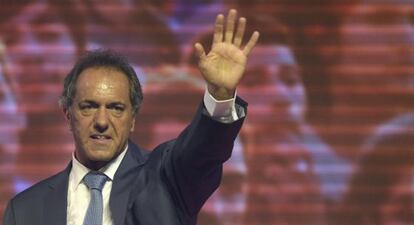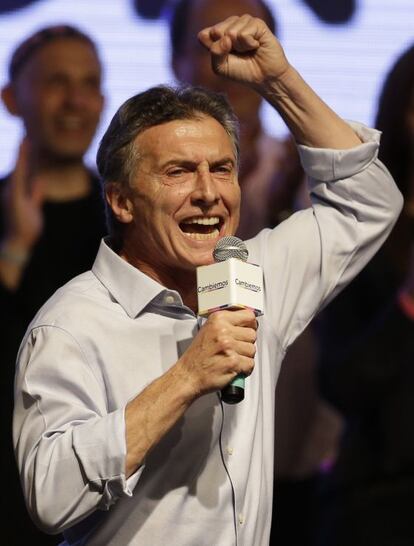Argentina faces presidential runoff after unexpectedly tight vote
Conservative Macri surprises voters by closing in on government candidate Scioli


Argentineans will vote in a presidential runoff next month after a major opposition candidate made a surprisingly strong showing against President Cristina Fernández de Kirchner’s handpicked contender, who was expected by many to win the presidency in the first round on Sunday.
With 97% of votes counted, Buenos Aires Mayor Mauricio Macri was within nearly two percentage points of tying with Buenos Aires governor Daniel Scioli, who was backed by the president and her powerful Kirchnerite Peronist movement.
The pollsters, the governors – everyone – deceived us” Daniel Scioli official
Scioli received 36.8% of the vote while Macri won 34.3%, according to results released early Monday.
The tight race means that Argentineans will head to the polls again on November 22, and many observers believe it likely that Macri, a conservative millionaire businessman, will defeat Scioli and end 12 years of leftist Kirchnerite governments.
“What has occurred tonight changes politics in this country,” the 56-year-old Macri told jubilant supporters.
A Macri victory next month would have important implications for Argentina, which, under late President Néstor Kirchner, helped forge a regional alliance of leftist governments with Venezuela, Bolivia, Brazil and, later, Ecuador.
Despite Scioli’s victory on Sunday, the results were seen as a blow to the Fernández de Kirchner government, which has faced a string of domestic and international scandals during its second term in office. The 58-year-old Scioli had pledged not to seek any radical changes to the president’s current policies if he is elected.

Under Argentina’s Constitution, Fernández de Kirchner, who succeeded her late husband in 2007, is barred from serving a third consecutive term. But she can run again in four years.
A third candidate, Sergio Massa, who was a former ally of Fernández de Kirchner until he joined the Peronist opposition faction, won 21% of the vote.
Massa’s better-than-expected showing also poses serious difficulties for the Kirchnerite movement. Scioli would need to grab the votes given to Massa for a win next month – something many observers believe will be difficult.
Macri was able to generate support from middle-class and Peronist voters fed up with public corruption scandals and government economic policies.
The government delayed releasing the official counts for about six hours, which set off speculation across the country. In some neighborhoods in central Buenos Aires, residents began beating pots and pans as a form of protest.
Before the results were announced, Scioli, who already seemed to be gearing up for the second round, attacked his friend Macri, whom he called “a candidate of belt-tightening” polices.
“If Macri has a say, we wouldn’t have universal payment for each child, YPF [the government-controlled oil company] wouldn’t be state-owned, nor would Aerolíneas Argentinas,” Scioli said.
Scioli had promised to return to speak to supporters later that evening but never came back to the podium. After the first results were announced, his supporters appeared devastated.
“The pollsters, the governors – everyone – deceived us,” said one Scioli official after the results came in.
As she cast her ballot on Sunday, President Fernández de Kirchner said “we are all voting in a normal country.”
But Argentina is not the same nation it was in 2011 when she won a second term with 54% of the vote and little opposition.
Corruption cases, including one involving her vice president, Amado Boudou, who faces various criminal charges, have surfaced over the past few years.
The president’s ongoing battle with Argentina’s international creditors, which forced a US federal judge to issue an injunction against the government, and a devaluation of the peso last year, has also tarnished her image. Even though she remains popular, especially among the poorer classes, Argentineans are struggling with a 25% annual inflation rate.
Nearly 80% of more than 32 million eligible voters cast their ballots on Sunday. Under Argentinean law, voting is mandatory for all citizens between the ages of 18 and 69, and optional for 16- and 17-year-olds, and those over 70.
Voters also elected candidates to Congress, and chose governors, mayors and councilors in a number of provinces.
English version by Martin Delfín.
Tu suscripción se está usando en otro dispositivo
¿Quieres añadir otro usuario a tu suscripción?
Si continúas leyendo en este dispositivo, no se podrá leer en el otro.
FlechaTu suscripción se está usando en otro dispositivo y solo puedes acceder a EL PAÍS desde un dispositivo a la vez.
Si quieres compartir tu cuenta, cambia tu suscripción a la modalidad Premium, así podrás añadir otro usuario. Cada uno accederá con su propia cuenta de email, lo que os permitirá personalizar vuestra experiencia en EL PAÍS.
¿Tienes una suscripción de empresa? Accede aquí para contratar más cuentas.
En el caso de no saber quién está usando tu cuenta, te recomendamos cambiar tu contraseña aquí.
Si decides continuar compartiendo tu cuenta, este mensaje se mostrará en tu dispositivo y en el de la otra persona que está usando tu cuenta de forma indefinida, afectando a tu experiencia de lectura. Puedes consultar aquí los términos y condiciones de la suscripción digital.








































